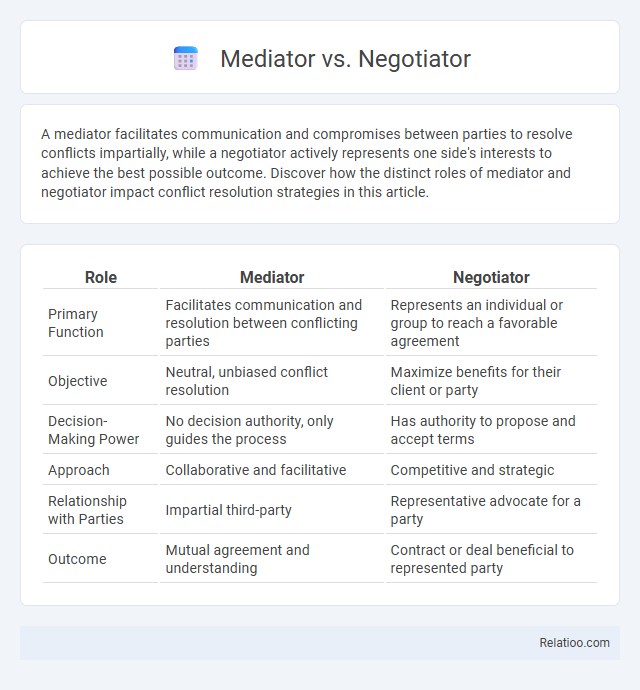A mediator facilitates communication and compromises between parties to resolve conflicts impartially, while a negotiator actively represents one side's interests to achieve the best possible outcome. Discover how the distinct roles of mediator and negotiator impact conflict resolution strategies in this article.
Table of Comparison
| Role | Mediator | Negotiator |
|---|---|---|
| Primary Function | Facilitates communication and resolution between conflicting parties | Represents an individual or group to reach a favorable agreement |
| Objective | Neutral, unbiased conflict resolution | Maximize benefits for their client or party |
| Decision-Making Power | No decision authority, only guides the process | Has authority to propose and accept terms |
| Approach | Collaborative and facilitative | Competitive and strategic |
| Relationship with Parties | Impartial third-party | Representative advocate for a party |
| Outcome | Mutual agreement and understanding | Contract or deal beneficial to represented party |
Understanding the Roles: Mediator vs Negotiator
Understanding the roles of mediator versus negotiator highlights key distinctions in conflict resolution processes: a mediator acts as a neutral third party facilitating communication and fostering mutual agreement without imposing decisions, while a negotiator directly represents the interests of one party, aiming to secure favorable terms through strategic bargaining. Your ability to recognize these differences ensures effective engagement in dispute resolution, maximizing outcomes by selecting the appropriate role for collaboration or advocacy. Clear comprehension of mediator versus negotiator functions empowers you to navigate conflicts with precision and achieve balanced, satisfactory agreements.
Key Responsibilities of a Mediator
A mediator facilitates communication between disputing parties to help them reach a mutually acceptable agreement without imposing decisions. Key responsibilities include managing dialogue, identifying underlying issues, and promoting understanding while maintaining neutrality. Unlike negotiators, who represent parties' interests, mediators act as impartial facilitators ensuring fairness and collaboration throughout the dispute resolution process.
Essential Functions of a Negotiator
A negotiator's essential functions include facilitating dialogue between conflicting parties, identifying key interests, and crafting mutually beneficial agreements that prevent escalation. Unlike mediators who remain neutral facilitators, negotiators actively advocate for their client's goals while seeking compromise. Your success in negotiation hinges on strategic communication, problem-solving, and the ability to create value amid competing priorities.
Core Differences Between Mediation and Negotiation
Mediation involves a neutral third party facilitating communication between disputing parties to help them reach a mutually acceptable agreement, whereas negotiation is a direct dialogue between the parties themselves aiming to resolve their conflict without third-party intervention. The core difference lies in the mediator's role to guide the process and ensure fairness, while negotiation relies entirely on the parties' skills and willingness to compromise. Mediation often results in a more structured and legally recognized resolution, contrasted with the flexible and informal nature of negotiation outcomes.
Required Skills: Mediator vs Negotiator
Effective mediators require strong impartiality, active listening, and emotional intelligence to facilitate mutual understanding without imposing solutions, while negotiators must excel in persuasion, strategic thinking, and assertiveness to advocate for your interests and secure favorable agreements. Both roles demand exceptional communication skills, but mediators prioritize neutrality and conflict resolution techniques, whereas negotiators focus on achieving specific goals and leverage bargaining tactics. Understanding these distinct skill sets ensures you select the right approach for resolving disputes or striking deals successfully.
Common Scenarios: When to Use Each
In conflict resolution, a mediator is ideal when parties need a neutral third party to facilitate communication and help find a mutually acceptable solution. A negotiator is suited for situations where direct discussions between parties aim to reach an agreement, often involving business deals or legal settlements. Your choice between mediator and negotiator depends on whether you require unbiased mediation or strategic negotiation to resolve disputes effectively.
The Mediation Process Explained
The mediation process involves a neutral third party, the mediator, who facilitates communication and guides disputing parties toward a mutually acceptable resolution without imposing a decision. Unlike a negotiator, who advocates for their own party's interests in direct discussions, the mediator remains impartial and helps clarify issues, explore options, and build understanding. Your active participation and willingness to collaborate are essential for the mediation process to achieve effective conflict resolution.
The Negotiation Process Unveiled
The negotiation process unfolds through distinct roles where a negotiator directly advocates for their party's interests, striving for a mutually beneficial agreement. A mediator facilitates communication between conflicting parties, aiming to clarify issues and foster understanding without imposing solutions. Understanding these dynamics allows you to navigate disputes effectively, recognizing when to negotiate assertively or engage a mediator to bridge gaps in communication.
Benefits and Challenges of Mediation
Mediation offers a collaborative approach where a neutral third party, the mediator, facilitates communication to help you reach a mutually acceptable agreement, reducing conflict and promoting understanding. Benefits of mediation include cost-effectiveness, confidentiality, and faster resolution compared to litigation, while challenges involve reliance on voluntary participation and the possibility of power imbalances affecting fairness. Unlike negotiators who represent parties' interests or arbitrators who impose decisions, mediators empower parties to control the outcome while guiding the process constructively.
Choosing the Right Approach: Mediation or Negotiation
Choosing the right approach between mediation and negotiation depends on the complexity and emotional intensity of the conflict; mediation involves a neutral third party to facilitate resolution, while negotiation is a direct dialogue between the parties involved. Mediation is optimal for disputes requiring structured communication and impartial guidance, often used in legal, workplace, or family conflicts. Negotiation suits simpler disagreements where parties maintain a willingness to cooperate and reach a mutual agreement without external intervention.

Infographic: Mediator vs Negotiator
 relatioo.com
relatioo.com